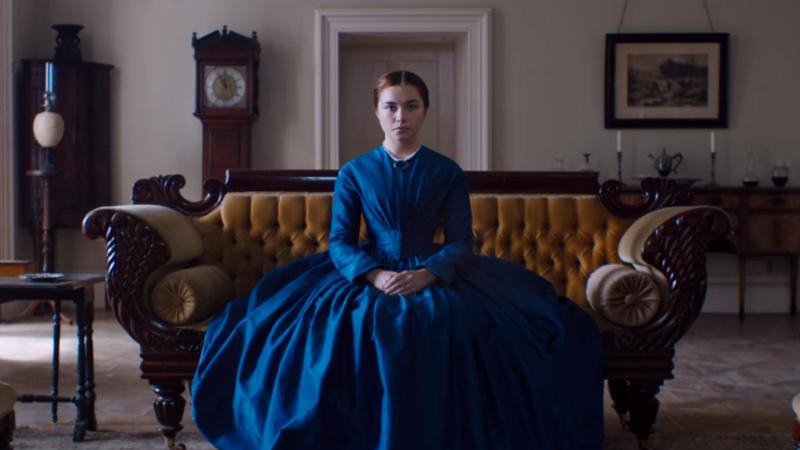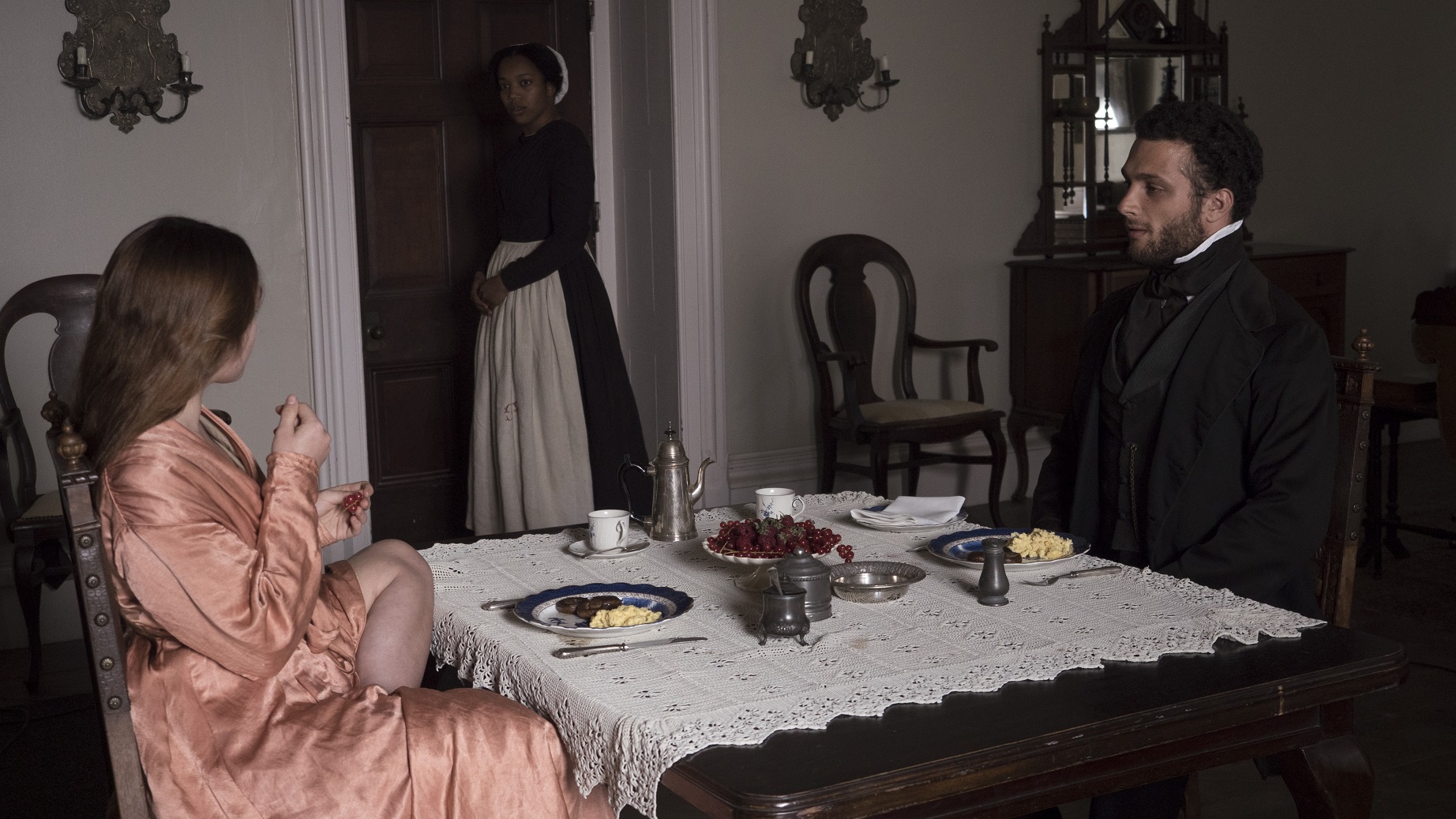Lady Macbeth review - memorably nasty | reviews, news & interviews
Lady Macbeth review - memorably nasty
Lady Macbeth review - memorably nasty
Feminist psychosis in 19th-century Northumberland

The Scottish play’s traces are faint in this bloody, steamy tale of feminist psychosis.
Though Katherine is lady of the manor, this is a tale of gilt-edged slave days from a female perspective – Naomi Ackie, as her black maid Anna (pictured below between Pugh and Cosmo Jarvis), adds another angle. The hollowly echoing, lifeless stone of a house she can’t leave, and the clink of cutlery at otherwise silent meals, combine with humiliation at bedtime, when Alexander wanks uselessly, and she is blamed for their childlessness. Christopher Fairbank, as Alexander’s callous dad Boris, is the ultimate monster in this mausoleum. Even the men’s sadism is somehow anaemic, in contrast to Katherine’s vainly pumping blood. Any woman would feel like screaming, or, like Shakespeare’s Scottish queen, plot to kill and kill. Theatre and opera director William Oldroyd’s feature debut is heavy on colour-coded atmosphere, from Katherine’s electric blue dress to the lush countryside she sometimes escapes to. As Sebastian, the violent servant she erupts with lust for, the part-Armenian Cosmo Jarvis (pictured below right with Pugh), is in this context a dark, forbidden other in the mansion’s pale world. This recalls Andrea Arnold’s Wuthering Heights (2011), when the “Laskar” skin of Heathcliff allowed an interracial affair with Cathy. Race, as well as class and gender, also simmer in Lady Macbeth’s 19th century rustic England.
Theatre and opera director William Oldroyd’s feature debut is heavy on colour-coded atmosphere, from Katherine’s electric blue dress to the lush countryside she sometimes escapes to. As Sebastian, the violent servant she erupts with lust for, the part-Armenian Cosmo Jarvis (pictured below right with Pugh), is in this context a dark, forbidden other in the mansion’s pale world. This recalls Andrea Arnold’s Wuthering Heights (2011), when the “Laskar” skin of Heathcliff allowed an interracial affair with Cathy. Race, as well as class and gender, also simmer in Lady Macbeth’s 19th century rustic England.
The affair with Sebastian, conducted in Alexander’s absence, continues on his return. Katherine’s addiction to their sex’s life-force, and her own awakened agency, won’t be stilled. But finally even this leaves her torpid. What begins as sexual power becomes a matter of vampiric survival, as she pushes herself further out on a social limb. In this world, female independence requires murderous madness. Pugh, aged 19 during Lady Macbeth’s shoot, powerfully conjures a woman who, having escaped her trap, pulses with heedless, consuming sex and violence, and underlying, unrelenting desperation. The fatal end reserved for transgressive women in 19th century literature is tweaked a little from the book, but she remains a fascinating creature.
Pugh, aged 19 during Lady Macbeth’s shoot, powerfully conjures a woman who, having escaped her trap, pulses with heedless, consuming sex and violence, and underlying, unrelenting desperation. The fatal end reserved for transgressive women in 19th century literature is tweaked a little from the book, but she remains a fascinating creature.
Oldroyd and screenwriter Alice Birch don’t, though, quite find the tempo for the increasingly giddy grand guignol. The first hands-on murder is a convincing, shocking bit of chaos. But as the Lady’s crimes pile up, absurdity creeps in. The early, aristocratic Northern chill convinces much more than the supposedly feverish end.
Perhaps it’s the tale’s origins with Leskov, a despised outsider in Imperialist Russia’s leftist salons, which anyway gives Lady Macbeth’s feminism its memorably nasty edge. The blade is swung wildly, though, and blunts too soon.
rating
Share this article
The future of Arts Journalism
You can stop theartsdesk.com closing!
We urgently need financing to survive. Our fundraising drive has thus far raised £49,000 but we need to reach £100,000 or we will be forced to close. Please contribute here: https://gofund.me/c3f6033d
And if you can forward this information to anyone who might assist, we’d be grateful.

Subscribe to theartsdesk.com
Thank you for continuing to read our work on theartsdesk.com. For unlimited access to every article in its entirety, including our archive of more than 15,000 pieces, we're asking for £5 per month or £40 per year. We feel it's a very good deal, and hope you do too.
To take a subscription now simply click here.
And if you're looking for that extra gift for a friend or family member, why not treat them to a theartsdesk.com gift subscription?
more Film
 The Mastermind review - another slim but nourishing slice of Americana from Kelly Reichardt
Josh O'Connor is perfect casting as a cocky middle-class American adrift in the 1970s
The Mastermind review - another slim but nourishing slice of Americana from Kelly Reichardt
Josh O'Connor is perfect casting as a cocky middle-class American adrift in the 1970s
 The Perfect Neighbor, Netflix review - Florida found-footage documentary is a harrowing watch
Sundance winner chronicles a death that should have been prevented
The Perfect Neighbor, Netflix review - Florida found-footage documentary is a harrowing watch
Sundance winner chronicles a death that should have been prevented
 Blu-ray: Le Quai des Brumes
Love twinkles in the gloom of Marcel Carné’s fogbound French poetic realist classic
Blu-ray: Le Quai des Brumes
Love twinkles in the gloom of Marcel Carné’s fogbound French poetic realist classic
 Frankenstein review - the Prometheus of the charnel house
Guillermo del Toro is fitfully inspired, but often lost in long-held ambitions
Frankenstein review - the Prometheus of the charnel house
Guillermo del Toro is fitfully inspired, but often lost in long-held ambitions
 London Film Festival 2025 - a Korean masterclass in black comedy and a Camus classic effectively realised
New films from Park Chan-wook, Gianfranco Rosi, François Ozon, Ildikó Enyedi and more
London Film Festival 2025 - a Korean masterclass in black comedy and a Camus classic effectively realised
New films from Park Chan-wook, Gianfranco Rosi, François Ozon, Ildikó Enyedi and more
 After the Hunt review - muddled #MeToo provocation
Julia Roberts excels despite misfiring drama
After the Hunt review - muddled #MeToo provocation
Julia Roberts excels despite misfiring drama
 London Film Festival 2025 - Bradley Cooper channels John Bishop, the Boss goes to Nebraska, and a French pandemic
... not to mention Kristen Stewart's directing debut and a punchy prison drama
London Film Festival 2025 - Bradley Cooper channels John Bishop, the Boss goes to Nebraska, and a French pandemic
... not to mention Kristen Stewart's directing debut and a punchy prison drama
 Ballad of a Small Player review - Colin Farrell's all in as a gambler down on his luck
Conclave director Edward Berger swaps the Vatican for Asia's sin city
Ballad of a Small Player review - Colin Farrell's all in as a gambler down on his luck
Conclave director Edward Berger swaps the Vatican for Asia's sin city
 London Film Festival 2025 - from paranoia in Brazil and Iran, to light relief in New York and Tuscany
'Jay Kelly' disappoints, 'It Was Just an Accident' doesn't
London Film Festival 2025 - from paranoia in Brazil and Iran, to light relief in New York and Tuscany
'Jay Kelly' disappoints, 'It Was Just an Accident' doesn't
 Iron Ladies review - working-class heroines of the Miners' Strike
Documentary salutes the staunch women who fought Thatcher's pit closures
Iron Ladies review - working-class heroines of the Miners' Strike
Documentary salutes the staunch women who fought Thatcher's pit closures
 Blu-ray: The Man in the White Suit
Ealing Studios' prescient black comedy, as sharp as ever
Blu-ray: The Man in the White Suit
Ealing Studios' prescient black comedy, as sharp as ever
 The Woman in Cabin 10 review - Scandi noir meets Agatha Christie on a superyacht
Reason goes overboard on a seagoing mystery thriller
The Woman in Cabin 10 review - Scandi noir meets Agatha Christie on a superyacht
Reason goes overboard on a seagoing mystery thriller

Add comment